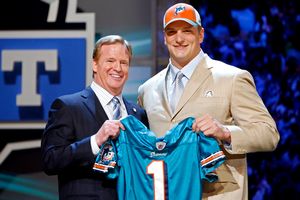But that's not all they should be getting ready for, because early departure to the NFL may soon become a more attractive option.
NFL commissioner Roger Goodell recently called it "ridiculous" to reward unproven rookies with contracts like the one No. 1 pick Jake Long got from the Miami Dolphins -- a five-year deal with $30 million guaranteed. Plenty of players around the league would prefer to see more of the money go to veterans.
The owners recently opted out of the collective bargaining agreement, which means it will expire in 2011 instead of 2013. But if there isn't a new deal by March 2009, an absence of one would trigger big changes -- there would be no 2010 salary cap, and the framework of free agency would change. [+] Enlarge
AP Photo/Jason DeCrow
Count Roger Goodell, left, among those who believe No. 1 pick Jake Long is making too much money.
Let's presume the sides find common ground for a new deal next spring, keep 2009 in place under its existing structure, but agree on some revision to rookie salaries starting in 2010.
If you're a junior this fall, you'll want to get into the league as soon as you can. Wait, and you'd be part of the first draft class to enter after the system is changed, perhaps costing yourself millions.
Agent Ian Greengross thinks that if an inequity exists in the salaries top picks are getting, it doesn't last very deep into the draft. He's negotiated first-round deals for Oakland running back Darren McFadden, Houston defensive tackle Amobi Okoye and Indianapolis running back Joseph Addai.
Greengross and his fellow agents cannot talk to players who are true juniors or younger. Barring family issues or hardships, he said he's always offered blanket encouragement for juniors to stay in school. If there is potential for the financial landscape for rookies to change, however, he might come to see things differently.
"As the 10th pick [in 2007], Amobi Okoye got $12.5 million in bonuses and guarantees," Greengross said. "If next year [the 10th pick] still gets the two-year increase above him but there is the possibility that the year after that you'd get cut down to $5 million, you would think some of those juniors would look at that and say, 'It's to my economic advantage to declare early and take my chances. Because even if I go in the second round, I'm not losing that much -- next year will be cut down anyway.'"
Former Denver general manager Ted Sundquist said he expects things will change for the NFL's college advisory committee on which he once served. He hopes juniors who consider declaring for the draft still listen to the committee's recommendations.

NFL.com Video
Jake Long, the No. 1 overall pick in the 2008 Draft.
"What it may do is at least temporarily overload the system," he said. "The CAC may get blasted with, who knows, twice as many evaluations as they have in the past."
Texas Tech coach Mike Leach doesn't believe juniors will rush to beat changes to the NFL's system.
"I don't think that would happen, because if they leave early, they're idiots because the scale would go up [the next year]," he said. "They need to remember that the success rate of players who leave early is dismal. Historically, guys lose money if they come out early, and a lot of these agents are nothing but loan sharks. And all these players who would be so worried about how much money they're going to make just need to be worried about making the team."
Those involved have not publicly floated any solid proposals about how rookie salaries could be changed.
Will Goodell and the owners push for a NBA-style rookie salary scale in which the numbers are predetermined? Will owners look to cut down the numbers only on the first handful of picks? Will they try to negotiate something in between?
Some of the conversation amounts to posturing.
Few teams didn't have the cap space they needed to chase whom they wanted when free agency began. And if teams are so concerned about rookies outdoing proven performers in the paycheck department, plenty of clubs still have enough room to redo the contracts of select veterans right now.
Sundquist thinks an adjustment to rookie deals needs to be made and said he thinks one fair way to alter rookie salaries is to get back to the intention of the rookie pool -- the total cap number a team is allowed to spend on its draft class, figured by a formula that considers the previous cost of the same slots.
Agents and teams manage to keep first-round picks in line with the rookie pool by negotiating option or roster bonuses for later in the deal.
"There would have to be some sort of cap on guaranteed money -- signing bonus, option bonus," Sundquist said. "The rookie pool in a sense was a good idea -- in a sense it controlled those first-year numbers. But it ended up controlling those first-year numbers and putting a great deal of guaranteed money in the second year, which at times becomes very difficult for teams to swallow.
"After one year, you can quickly figure out sometimes that you've missed. Then you're staring down the double barrel of an option bonus or a guaranteed buyout."
Complicated contracts can be difficult to compare in real dollars, but on a recent edition of ESPN's "NFL Live" it was suggested the deal for the third pick in the draft, Atlanta quarterback Matt Ryan, actually puts him ahead of Tom Brady and Peyton Manning. Ryan's deal has been framed as worth $72 million for six years and includes $34.75 million guaranteed.

NFL.com Video
Find out what makes Matt Ryan a legitimate franchise quarterback.
Ryan said he understands both sides of the debate.
Green Bay cornerback Al Harris is OK with some rookies hitting the jackpot, but unsurprisingly prefers when it's veterans who get the big bucks.
"I think some guys, they do a great job in college and they should get a significant amount of money," Harris said. "If you get paid, that's your blessing, and I'm for that. But if there is another quarterback that's making more than Tom Brady or Peyton Manning, you probably should look into it."
Like Harris, NFLPA president Kevin Mawae has said he's not mad at rookies, that all players should get all they can get when they can get it.
The Titans center doesn't consider rookie salaries a huge issue at this point, though he said he's aware it may rate as one for management.
"You've got what, 250 kids getting drafted this year, and only five of them are making that kind of money," Mawae said. "So the problem is probably not as big as everybody's making it out to be."
He pointed to two young players on his own offensive line, Michael Roos and David Stewart, who recently signed big extensions.
"Guys are getting the money, and it's not just the top three draft picks, but it would seem that way because the media focuses on the rookies coming out," he said. "It's one of those deals. You get the big contract, a lot is expected out of you, and if you don't perform you're not going to get another one."
Which is what makes the first one so important.
Which is what will prompt more juniors to declare for the draft and get that contract before anything changes.
Ryan respects Goodell’s view on rookie contracts
United Top IFFHS Rankings
Teams preparing for future at draft
Goodell: Current pay for NFL rookies ‘ridiculous’